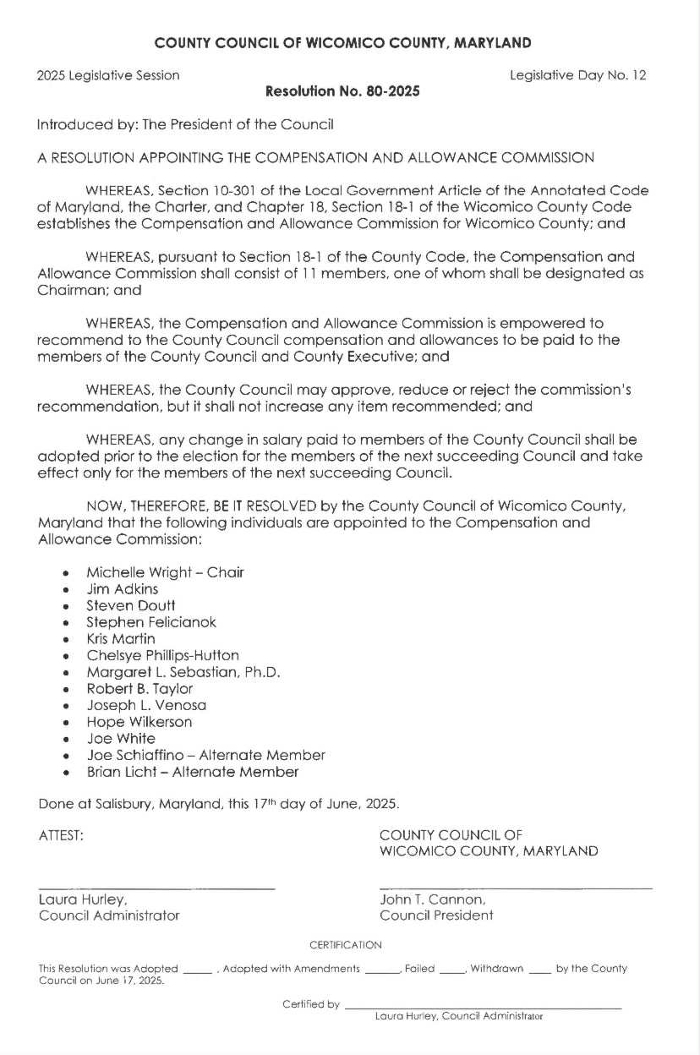Concerns Regarding the County Council's Appointment of the Compensation and Allowance Commission

Wicomico County, MD - On June 17, 2025, a decision will be made by the Wicomico County Council on Resolution 80-2025, where they will appoint members to the Compensation and Allowance Commission and after viewing the names listed, it has raised significant concerns about fairness and impartiality, and more concerning, the future of Wicomico County, Maryland.
This is especially worrisome given that several appointees have a documented and easy to find history of opposing the County Executive's position. The Compensation and Allowance Commission holds considerable power, as it directly sets the salaries and allowances for the County Council, County Executive and County Sheriff.
The integrity of such a body is crucial for maintaining balance and impartiality in local governance. Unfortunately, the current list of appointees undermines these principles.
Questionable Appointments
According to Resolution 80-2025, the list of proposed appointees includes at least four individuals who have publicly opposed the County Executive and the role itself. These individuals have been vocal advocates for eliminating the County Executive position, as demonstrated by their substantial involvement in the "Question A" initiative, which sought to remove the role altogether. Their alignment with the County Council's interests and ongoing criticism of the County Executive raises doubts about their ability to serve fairly and objectively.
It is important to note that the Compensation and Allowance Commission is expected to function as a neutral entity, ensuring that compensation decisions are free from political bias and personal agendas. However, appointing individuals who have clearly demonstrated bias against the County Executive contradicts the principles of transparency and impartiality.
Potential Risks
The implications of these appointments are concerning. Based on their past actions, these appointees might exploit their authority to influence the County Executive's salary to an unsustainable level, potentially making the role unattractive for current or future executives.
Over time, this could diminish the effectiveness of the position or deter qualified individuals from seeking it.
The previous actions of these appointees are directly tied to potential conflicts of interest:
Open Opposition: These individuals have consistently expressed disdain for the County Executive role and have strongly supported transferring its responsibilities back to the County Council.
Conflict of Interest: Given their alignment with the Council's interests and their personal history of opposing the Executive, it is questionable whether they can fairly evaluate compensation for a position they fundamentally oppose.
Additionally, the strained relationship between the County Council and the County Executive exacerbates the situation. The collective efforts to undermine this position directly conflict with the impartiality required for the commission to operate effectively.
Addressing Counterarguments
Some might argue that the commission should include diverse viewpoints, even those critical of the County Executive role. However, "diverse viewpoints" should not mean appointing individuals with outright opposition or clear bias that threatens the integrity of the commission.
The purpose of this body is not to debate the validity of the County Executive's position but to provide fair and unbiased recommendations regarding compensation. Appointing individuals with a history of antagonism toward the position undermines this mandate.
Others may suggest that these appointees can separate personal biases from their professional responsibilities. While this is a valid consideration, the appointees' active opposition and public statements raise significant concerns about their objectivity.
A Call for Leadership and Oversight
To maintain public trust and ensure fairness in governance, the County Council must reevaluate the current list of appointees. Appointments to the Compensation and Allowance Commission should prioritize individuals who demonstrate impartiality, professionalism, and integrity.
Selecting unbiased and qualified members will help ensure that compensation decisions are not influenced by political motives or personal grievances.
Moreover, greater transparency is needed in the appointment process. The public deserves a clear understanding of how candidates are evaluated and selected. Establishing rigorous criteria for appointees, including a demonstrated ability to be impartial, could restore confidence in the commission's capability to operate fairly.
Concluding Thoughts
The County Council's decision to potentially appoint openly biased individuals to the Compensation and Allowance Commission undermines its credibility, effectiveness, and further raises questions about the integrity of the Wicomico County Council.
Ensuring that salaries and allowances are determined judiciously is vital for sustaining a functional and balanced government. Without impartial oversight, the Council risks further eroding public trust and destabilizing essential governance structures.
It is crucial for county officials to reflect critically on these appointments and prioritize the principles of fairness and accountability.






